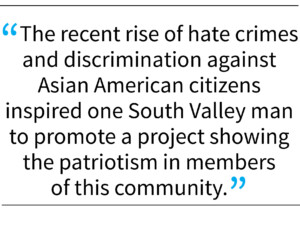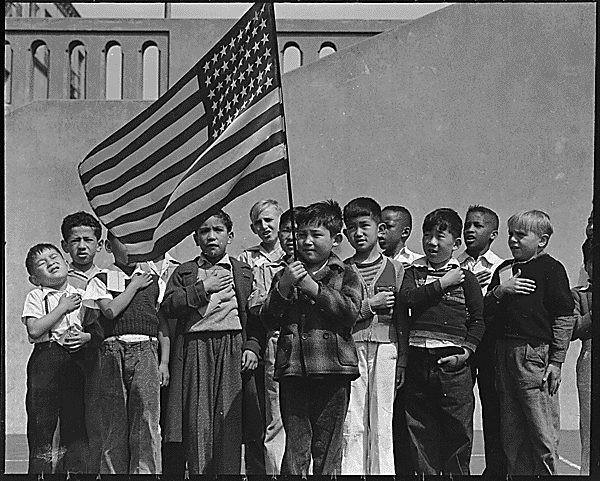Editorial: Let’s end hate crimes against Asian American citizens
Stand up against all forms of discrimination – and especially the recent rise of hate crimes against Asian American citizens
Asian American children salute the flag.
Photo courtesy National Archives
This editorial is the opinion of Gilroy Life
Since the spread of the coronavirus pandemic 12 months ago, across the United States Americans of Asian ancestry have reported a significant increase in hate crimes, harassment and discrimination. While most of the first incidents were simple discrimination or verbal insults, in recent months violent encounters have occurred with some Asians Americans killed and mutilated.
 Most people usually think of racism in the U.S. as something that happened in the South as a result of slavery and the aftermath of the Civil War. Black Americans were discriminated against for decades in southern states with laws promoting Jim Crow social and economic segregation and voter suppression. But if we are honest with our history, we have to acknowledge Californians have also long showed the ugly side of human nature with discrimination against members of the Asian American community.
Most people usually think of racism in the U.S. as something that happened in the South as a result of slavery and the aftermath of the Civil War. Black Americans were discriminated against for decades in southern states with laws promoting Jim Crow social and economic segregation and voter suppression. But if we are honest with our history, we have to acknowledge Californians have also long showed the ugly side of human nature with discrimination against members of the Asian American community.
During the pioneer days of the Gold Rush, thousands of Chinese men sailed to the newly formed state of California in the 1850s to try their luck in finding the precious metal in rugged mountains. Many faced violence from Whites who saw them as competitors for the search for gold. The discrimination was even made official when President Chester Arthur signed the Chinese Exclusion Act on May 6, 1882, prohibiting all immigration of Chinese laborers to our shores. It is the only law to have been implemented on a federal level keeping all members of a specific ethnic or national group from immigrating. The act was repealed during World War II when China became an ally of the U.S. and Americans needed to portray an image of fairness and justice. During that war, from an executive order by President Franklin D. Roosevelt, about 120,000 Americans of Japanese heritage were placed without due process of law in internment camps.
 Following World War II, racism against Asian-Americans citizens still continued. Consider the family story of Morgan Hill resident Nancy Lowe. Her grandfather, Albert Lowe Sr., faced discrimination as a young man when he worked at a bank. Despite his skills, he was never promoted to a managerial position. The reason why, he was bluntly told, was due to his Chinese ethnicity. Albert and his wife moved the family to Pasadena where he started a new career as a furniture store owner. He was so successful that in the mid-1940s he purchased property to build a home in the southern California city. The neighbors brought him a petition requesting that the family not move onto their street and resell the property to a Caucasian. They believed that the property title allowed only White people to dwell there.
Following World War II, racism against Asian-Americans citizens still continued. Consider the family story of Morgan Hill resident Nancy Lowe. Her grandfather, Albert Lowe Sr., faced discrimination as a young man when he worked at a bank. Despite his skills, he was never promoted to a managerial position. The reason why, he was bluntly told, was due to his Chinese ethnicity. Albert and his wife moved the family to Pasadena where he started a new career as a furniture store owner. He was so successful that in the mid-1940s he purchased property to build a home in the southern California city. The neighbors brought him a petition requesting that the family not move onto their street and resell the property to a Caucasian. They believed that the property title allowed only White people to dwell there.
“My grandfather didn’t give in and he still purchased (the property) and built a home,” Lowe said. “We got along fine with the neighbors once they got to know us.”
Subtle racism and discrimination against people of Asian heritage have continued on for decades in the United States. But with the COVID-19 pandemic and prejudiced comments from some politicians in the news and social media (such as referring to the “China virus” and “Kung flu), the level of racism has encouraged violent encounters. President Joe Biden in January issued an executive order condemning the attacks and the scapegoating of Chinese people for the pandemic. The order also calls for improved data collection about hateful incidents.
 “The federal government must recognize that it has played a role in furthering these xenophobic sentiments through the actions of political leaders, including references to the COVID-19 pandemic by the geographic location of its origin,” Biden said in his order. “Such statements have stoked unfounded fears and perpetuated stigma about Asian Americans and Pacific Islanders and have contributed to increasing rates of bullying, harassment, and hate crimes against AAPI persons.”
“The federal government must recognize that it has played a role in furthering these xenophobic sentiments through the actions of political leaders, including references to the COVID-19 pandemic by the geographic location of its origin,” Biden said in his order. “Such statements have stoked unfounded fears and perpetuated stigma about Asian Americans and Pacific Islanders and have contributed to increasing rates of bullying, harassment, and hate crimes against AAPI persons.”
The recent rise of hate crimes and discrimination against Asian American citizens inspired one South Valley man to promote a project showing the patriotism in members of this community. Retired dentist Jon Hatakeyama is working with the city of Morgan Hill to place a plaque in the community honoring the more than 12,000 Japanese-American men who fought fascism in Europe during World War II as soldiers of the famed 442nd Infantry Regiment of the U.S. Army. At a time when many of them had friends and families of Japanese ancestry imprisoned in internment camps, they patriotically marched into combat driven by the motto “Go For Broke!” Many who survived the war found their way to the South Valley.
We encourage our readers to stand up against all forms of discrimination – and especially the recent rise of hate crimes against Asian American citizens. One way to do this is to support Hatakeyama’s project recognizing the sacrifices of the men of the 442nd to save democracy, the greatest gift America ever gave to the world.

